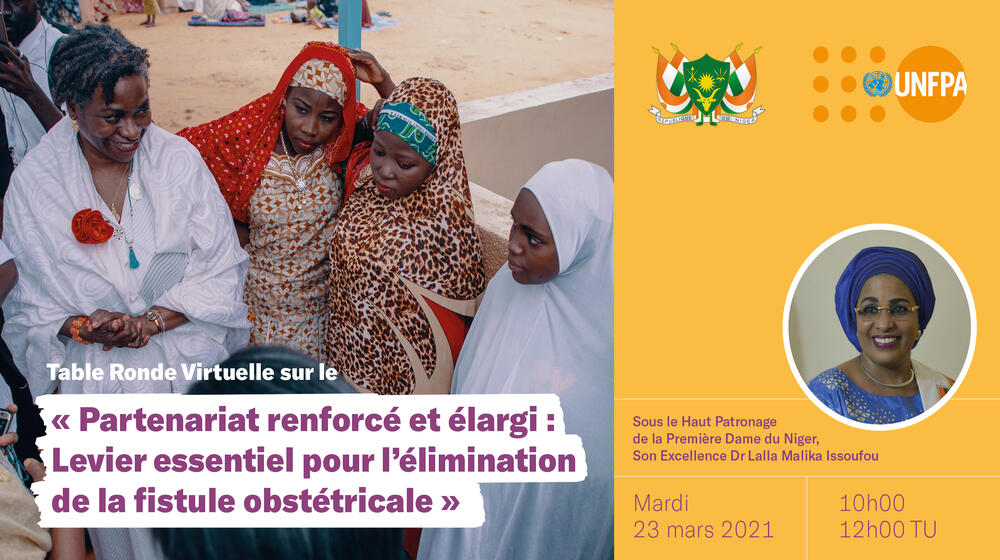Dakar, Senegal – 19 March, 2021: The United Nations Population Fund in West and Central Africa Regional Office (UNFPA WCARO) is organizing in partnership with the First Lady of Niger, Dr Lalla Malika Issoufou, a roundtable on the theme, "Strengthened and extended partnership: An essential lever for the elimination of obstetric fistula." The hybrid physical and virtual event is on Tuesday, 23 March 2021, from 10:00 to 12:00 GMT.
The roundtable objectives, is amongst others, to enhance advocacy, extend partnerships mobilise additional resources, including domestic resources, to ensure the regional plan’s efficient implementation to eliminate obstetric fistula in West and Central Africa.
According to UNFPA regional director for West and Central Africa, Mabingue Ngom, “this roundtable will help to re-mobilize the actors: Member States, technical partners and financial support around the regional strategy to fight against obstetric fistula covering the period 2019-2030, with a view to accelerating the commitment of partners to eradicate this scourge.”
Since 2003 UNFPA and its partners have been involved in the Campaign to End Obstetric Fistula, in which approximately 85,000 women and girls received restorative treatment. Nonetheless, more than two million more women continue to suffer from obstetric fistula, more than half of them in West and Central Africa - continue to live in disgraceful conditions. Despite the efforts made to help them, it is important to recognize that the pace remains slow. In 2018, 2,281 women received treatment in the region. The latest estimates show that between 600,000 and 1,000,000 cases are awaiting treatment.
In West and Central Africa, there are several direct and indirect causes of obstetric fistula. These included strong demographic growth (2.7%), the highest total fertility rate in the world (5.2 children per woman), poor access to reproductive health services, high child marriage prevalence (42%), and female genital mutilation (24%). FGM can reach 90% in some countries such as Sierra Leone, Mali and Guinea. To these is added the traditional low enrollment of girls (24%).
Women who suffer from fistulae due to childbirth, on average, suffer from this disease for 7.5 years of their life. This period generally corresponds to the first years of entering the labor market, which are thus sacrificed. More recently, the security threat in the Sahelian strip and the Covid19 pandemic have imposed an unprecedented limitation on the movements and displacements of populations, especially women and girls, thus limiting their access to reproductive health services. In addition, already fragile health services have seen their capacity to provide quality care greatly impacted. All of these indicators are not likely to promote the eradication of fistula and the care of patients.
The First Lady of Niger H.E. Dr. Lalla Malika Issoufou is actively mobilizing at the national and regional level to ensure high profile participation. First Ladies of some countries (Chad, Comoros, Congo, Côte d'Ivoire, Mauritania and Sierra Leone) have already confirmed their participation.
Other high profile participants include the African Union Commissioner for Social Affairs, Amira El Fadil, ECCAS Commissioner for Gender, Human and Social Development H.E. Yvette Ngandu Kapinga, ECOWAS Commissioner for Social Affairs and Gender of ECOWAS H.E. Dr Siga Fatima Jagne and the Nobel Peace Prize, and Founder of the Foundation Panzi in DRC, Dr. Denis Mukwege.
Contacts:
Habibou DIA, | Media Specialist | UNFPA WCARO |Phone: +221 78 620 45 13 | E-mail: dia@unfpa.org
Souleymane Saddi Maazu | Programme Communication and Advocacy Officer | UNFPA Niger | Tel. +227 20 72 29 80 ; +227 92 19 83 56 | E-mail : saddi@unfpa.org


